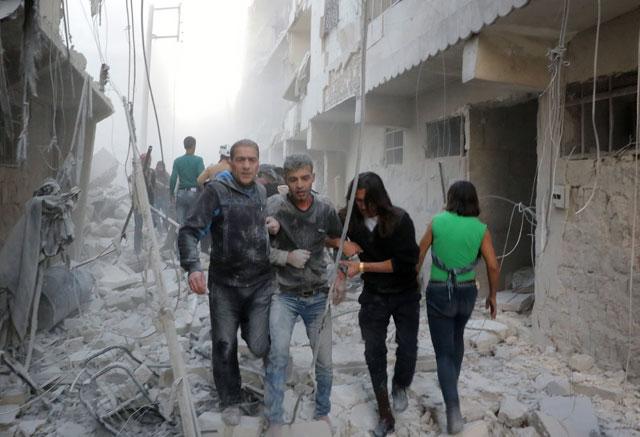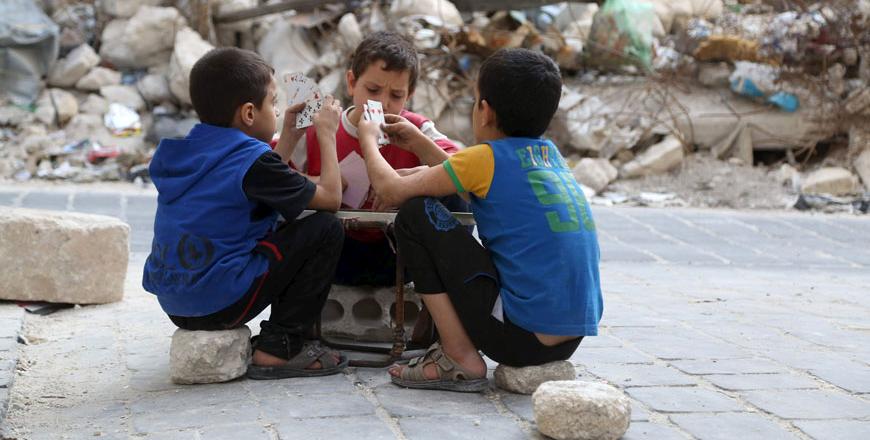You are here
Russia launches new offensive, air strikes hit Syria’s Aleppo
By AP - Nov 16,2016 - Last updated at Nov 16,2016

Wounded people are seen around the wreckage of buildings after the aircraft reportedly belonging to the Russian Army carried out an air strike on a residential area in Aleppo, on Tuesday (Anadolu Agency photo)
BEIRUT — Russia launched new strikes in Syria on Tuesday involving carrier-borne jets and long-range missiles as opposition activists on the ground reported that the first air strikes in nearly a month struck the besieged, rebel-held parts of the northern Syrian city of Aleppo.
According to activists, between four and 10 people were killed in the strikes on Aleppo, raising concerns of a return to daily deadly bombardment in Syria's largest city.
The Russian blitz began hours after Russian President Vladimir Putin and US President-elect Donald Trump discussed Syria over the phone and agreed on the need to combine efforts in the fight against what the Kremlin called their No. 1 enemy — "international terrorism and extremism".
The Obama administration has been trying for months to negotiate a ceasefire in Aleppo, a city that has become the epicentre of the war between President Bashar Assad and rebels fighting to topple him, some of whom receive US aid.
From the militants’ side, Al Qaeda’s Syrian affiliate is fighting alongside the rebels, but the Daesh terror group has no presence in Aleppo city.
Russian Defence Minister Sergei Shoigu reported to Putin that Su-33 jets from the aircraft carrier Admiral Kuznetsov are involved in the operation, marking its combat debut.
“We launched a major operation to strike the positions of Daesh and Jabhat Al Nusra in the provinces of Idlib and Homs,” Shoigu said at a meeting with Putin, referring to Al Qaeda’s branch in Syria by its old name. He said the Russian strikes are targeting ammunition depots, training camps and armaments factories.
As part of the Russian operation, a navy frigate launched long-range Kalibr cruise missiles and the military also used Bastion missiles stationed in Syria to strike militant targets in the rebel-held northern province of Idlib and the central province of Homs. Shoigu said that before launching the strikes, the military intelligence had thoroughly identified and selected targets, including factories producing toxic chemical agents.
“It’s a well-developed, industrial-scale production,” he said, adding that the strikes will continue. He did not mention Aleppo.
Meanwhile, Syrian activists reported strikes in all three places — Idlib, Homs and Aleppo.
The Britain-based Syrian Observatory for Human Rights said missiles fired from Russian warships in the Mediterranean struck areas in Aleppo province and on the eastern edge of nearby Idlib. The observatory’s chief, Rami Abdurrahman, said the areas hit with missiles are strongholds of extremist groups, including the Al Qaeda affiliate known as Fatah Al Sham Front.
The observatory and other groups said air strikes also struck at least eight neighbourhoods in Aleppo city, killing at least 10 people. The Local Coordination Committees, another activist group, said the air strikes on Aleppo killed four and wounded others.
Ibrahim Al Haj, of the Syrian civil defence, said that by late afternoon his group had counted 72 air raids in nine different neighbourhood of eastern Aleppo. He said four people were killed and 32 were wounded in attacks that mostly hit residential areas in the besieged city.
Sounds of warplanes flying at low altitude could be clearly heard over the phone.
Russian Defence Ministry Maj. Gen. Igor Konashenkov insisted that the Russian military did not strike any targets in the city of Aleppo, adding that Russian and Syrian warplanes have not conducted any raids on the city for four weeks.
Activist Baraa Al Halaby, who is based in eastern Aleppo, said via text messages that warplanes are firing missiles and helicopters are dropping barrel bombs on the eastern part of the city.
“People are scared. The bombardment is intense,” Halaby wrote.
A reporter for Syrian state TV, speaking from the government-held western part of the city, said troops are preparing to attack eastern Aleppo from nine directions.
Four weeks ago, Russia said it would halt weeks of deadly air strikes to allow rebels and supporters to leave eastern Aleppo. The rebels refused to take up the offer and the United Nations failed to negotiate the delivery of aid into the besieged area.
The Lebanon-based Al Mayadeen TV aired live footage from Aleppo, showing smoke billowing from eastern parts of the city, contested since 2012.
On Saturday, Syrian government troops repelled a rebel offensive on the western parts of Aleppo designed to break the siege on the opposition-held east. The government siege has left an estimated 275,000 people trapped, with no aid allowed in since July, amid a punishing bombing campaign.
In the lead-up to the offensive, which was formally declared by the Russian defence ministry on Tuesday, a number of air strikes targeted at least three field hospitals in rural western Aleppo province, putting them out of order, the observatory and Thiqa news agency reported.
Syrian and Russian governments deny attacking hospitals. The UN rights agency, UNICEF and other UN agencies have repeatedly condemned airstrikes on hospitals and medical facilities.
Konashenkov, the defence ministry official, rejected the claims that Russian warplanes had bombed hospitals in Aleppo province as “outright lies”.
Since Syria’s conflict started in 2011, the US-based Physicians for Human Rights recorded 382 attacks on medical facilities and hospitals throughout Syria. Of those, 293 were carried out by government forces and 16 were by Russian warplanes, it said.
In the northwestern province of Idlib, a member of the extremist Jund Al Aqsa group known as Abu-Dardaa-Al Shami told The Associated Press over the telephone that the airstrikes are “much, much, much more intense than previous ones”. He added that in addition to the air raids, ballistic missiles hit the province near the town of Saraqeb.
In Geneva, meanwhile, two UN agencies said food production in Syria has shrunk to “an all-time low”, threatening to drive more people from their homes after five-and-a-half years of war.
The World Food Programme (WFP) and the Food and Agricultural Organisation said factors like rising prices, poor weather, general instability and the lack of fertiliser and seeds could force some farmers to stop producing. A joint report released on Tuesday says the planting area in the 2015-2016 season was the smallest ever in zones controlled by the government, ethnic Kurds and the armed opposition. WFP Spokeswoman Bettina Luescher said information was lacking about areas controlled by Daesh.
FAO regional representative Abdessalam Ould Ahmed said 80 per cent of households in Syria lack food or money to buy it.
Related Articles
BEIRUT — An offensive by Syrian insurgents aimed at the government-held part of the northern city of Aleppo has killed at least 74 civilians
SOCHI, Russia — Russia launched coordinated missile strikes against rebels in Syria on Tuesday and Moscow for the first time used its only a
BEIRUT — Russian and Syrian warplanes pounded targets in central and northern Syria, killing at least four civilians Sunday as ground troops



















